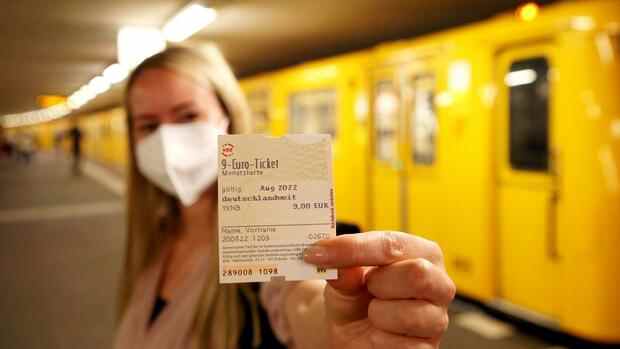Local transport companies and Deutsche Bahn sold the nine-euro ticket almost seven million times at the start. The numbers sound gigantic and yet say – nothing. Monthly ticket holders will buy the ticket, occasional drivers will behave no differently, bargain hunters will strike anyway. With a return trip, the nine euros are almost back, a second trip a month will be found.
So what’s the point of the ticket that the SPD, Greens and FDP coalition partners came up with in a late-night meeting to save FDP Finance Minister Lindner’s tank discount? The inventors of the cheap rail made three arguments – but they are all weak:
The ticket is part of the government’s relief package, putting it in the social policy category. In fact, it relieves people, but it is questionable whether it is necessary. This is how loyal subscription customers benefit, although they continue to drive as before. They would have been more happy about a loyalty bonus in the corona crisis. Employers in particular are now saving by reducing the job ticket subsidy to nine euros for their employees.
The temporary discount is also of little help to the climate. There are simply not enough people taking the bus and train to save a lot of CO2. It is also not the short distances that damage the climate, but those of more than 20 kilometers. Public transport is often canceled there.
Top jobs of the day
Find the best jobs now and
be notified by email.
Meanwhile, the limited ridiculous price is now ensuring that people are on the road more than usual. The companies are already eagerly advertising: how about a trip from Mainz to Alsace? Three hours travel time, there and back for nine euros. Why not? It is probably the most exciting aspect of the idea: a local transport ticket nationwide advertising campaign.
This “knowledge” costs 2.5 billion euros
For Transport Minister Wissing, the 2.5 billion euros in subsidies pay off “if local transport is permanently strengthened by additional passengers”. But every traffic expert knows that the price alone is not decisive.
>> Read also: These tricks are the best way to use the monthly ticket
It’s the soft factors: Is the bus stop nearby? Does the train run regularly and on time? Is there a seat or do I have to stand? What if I’m heading to more than one destination a day? On foot, by bike, bus or car: there are many ways to get to your destination, and the motives behind the choice are just as varied.
The federal and state governments want to evaluate the project. Unfortunately not scientifically independent, but with the market researchers of Deutsche Bahn on behalf of the transport company. The result is already apparent: the bargain hunters will be successful; for a better and modern public transport that inspires, but there is no money. This “knowledge” costs 2.5 billion euros.
It would be more important to clarify what local transport is supposed to do: Does it serve the public interest – or should it be a climate saver? Finally, there should be an end to the bad mixed financing of the federal and state governments. It’s collective irresponsibility that hurts mass transit the most.
More: The great chaos on the rails: Bahn boss prepares customers for hard times
